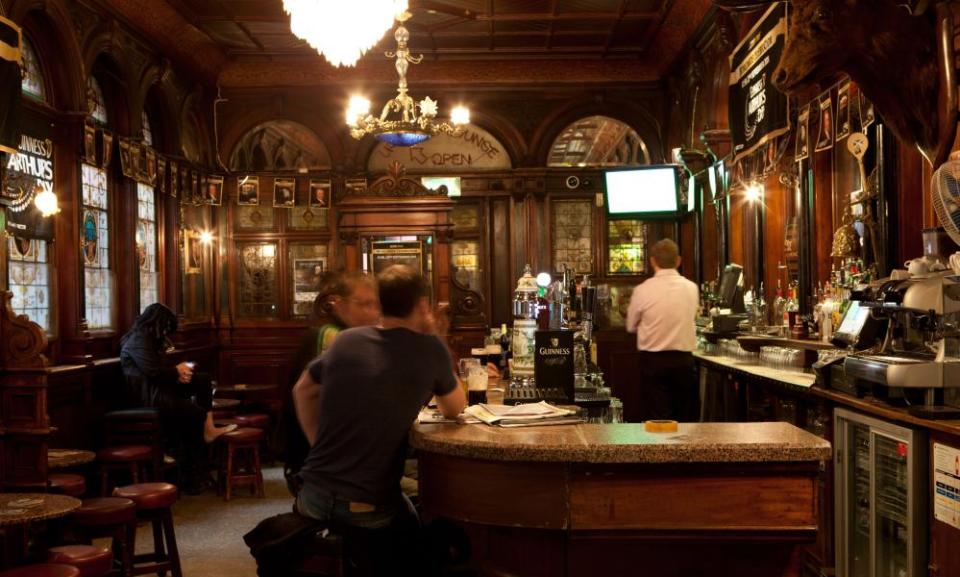Love by Roddy Doyle review – profundity down the pub

Roddy Doyle’s new novel is a shaggy dog story that seeks to explore the difficulty of saying goodbye to anything, and the experience of losing things and trying to get them back. Its most profound observation is that the sublime moments of our lives are often mundane, and that mundane moments contain the sublime within them. This is expressed with great skill, as the novel’s two protagonists’ whole lives are revealed through blunted dialogue in one dingy pub after another, over the course of a rambling Dublin evening. In its architecture, the milieu and voice Doyle adopts to tell his story, the novel succeeds in communicating something deeply moving about how shabby and run-down our hopes and fears can seem when we put them into words. However, Love is also an almost perverse and occasionally infuriating exercise, which at times resembles a challenge an exceptionally gifted writer has set himself: can I make a good novel out of a pub bore?
Joe meets Davy for dinner in Dublin. As young men, they were almost “the same man” – drinking partners who discovered the adult world of pubs together and fell in love with the same women, though Davy always had more luck. As adult life took them in different directions – Joe moving to England, Davy staying behind – they maintained a friendship, meeting up whenever Joe came home to drink and talk old times. Those meetings became less frequent as the years went by, though, and it seems to Joe that the two men have less and less in common. On this night, having not seen each other for some time, Davy thinks they’re meeting because he needs to tell Joe the story of how he bumped into a woman they were both once in love with, without ever really speaking to her or even, quite possibly, learning her name. He’s ended up leaving his wife, Trish, for this woman. Her name turns out to be Jessica.
The bulk of the book is a dialogue in which two men try and fail to say the same thing, over and over again
Though Doyle threads in flashbacks contrasting Davy’s relationship with Jessica with the story of how Joe fell in love with Faye, the woman who became his wife, the majority of the novel is a sustained sequence following two men down the rabbit-hole of drink as one of them tries, less and less successfully, to open up his heart to the other. This is difficult to do and is admirably achieved. But there’s a difference between admirable and enjoyable. There are moments of lyricism – as when Joe recalls the symptoms that led him, a year earlier, to undergo an MRI scan, when he felt as though he was experiencing time as a series of moments rather than a continuous flow. Tellingly, this passage occurs in a flashback sequence, where Doyle gives himself more room to inflect his material and reveal more than just the surface of what’s going on. He also writes brilliant comic sketches – Davy’s attempt to put his shoes on before telling Trish about Jessica, anticipating that she’ll kick him out, is wonderful. But the bulk of the book is a dialogue in which two men try and fail to say the same thing, over and over again. Frustratingly, there’s a sense that Doyle is consciously containing his dexterity in doing this – when Davy speaks of filling up with words as he goes through life but knowing that something’s still missing, a rare aria among the endless recitative, Joe thinks to himself, “I’d forgotten he spoke like that, that he’d once been capable of speaking like that.”
And then, as Joe and Davy’s night is coming to an end, something changes. Careful hints Doyle has dropped throughout his story that all this talk is really just a front, just a way of not looking at something else, are suddenly stitched together, and the whole performance has to be reinterpreted. The evening that’s been endured must now be read as a way of doing and saying anything to avoid embarking on the one thing that has to happen before the night is out. This is a beautifully handled and powerful reveal, and it means that, despite Love’s perverse repetitions, the book does eventually land some of its punches. The mundane in the beautiful, the beautiful in the mundane; the old friend you’ve drifted a thousand miles from but need tonight just as much as he needs you, because both of you knew each other back when life began. The rituals that fortified young men years ago, and must now be re-enacted to keep pain at bay for two men in late middle age. All this matters. Similar ideas are explored to devastating effect in John McGahern’s The Pornographer, without Love’s longeurs and flaws. But a book I wanted to throw across the room 50 pages from the end did, by the time I closed it, leave me sitting silently, thinking back over its story, and over losses of my own.
• Love is published by Jonathan Cape (£18.99). To order a copy go to guardianbookshop.com. Delivery fees may apply

